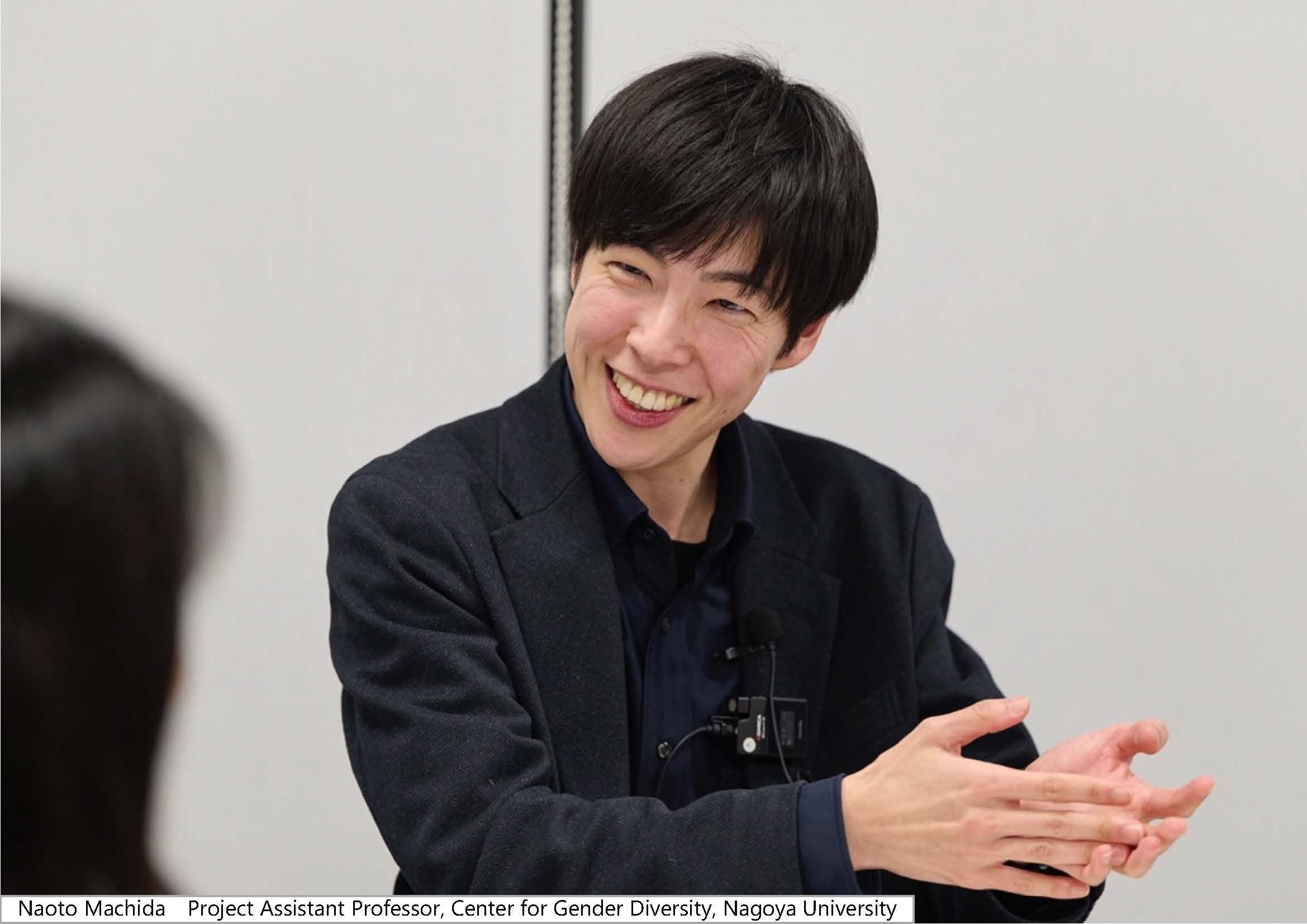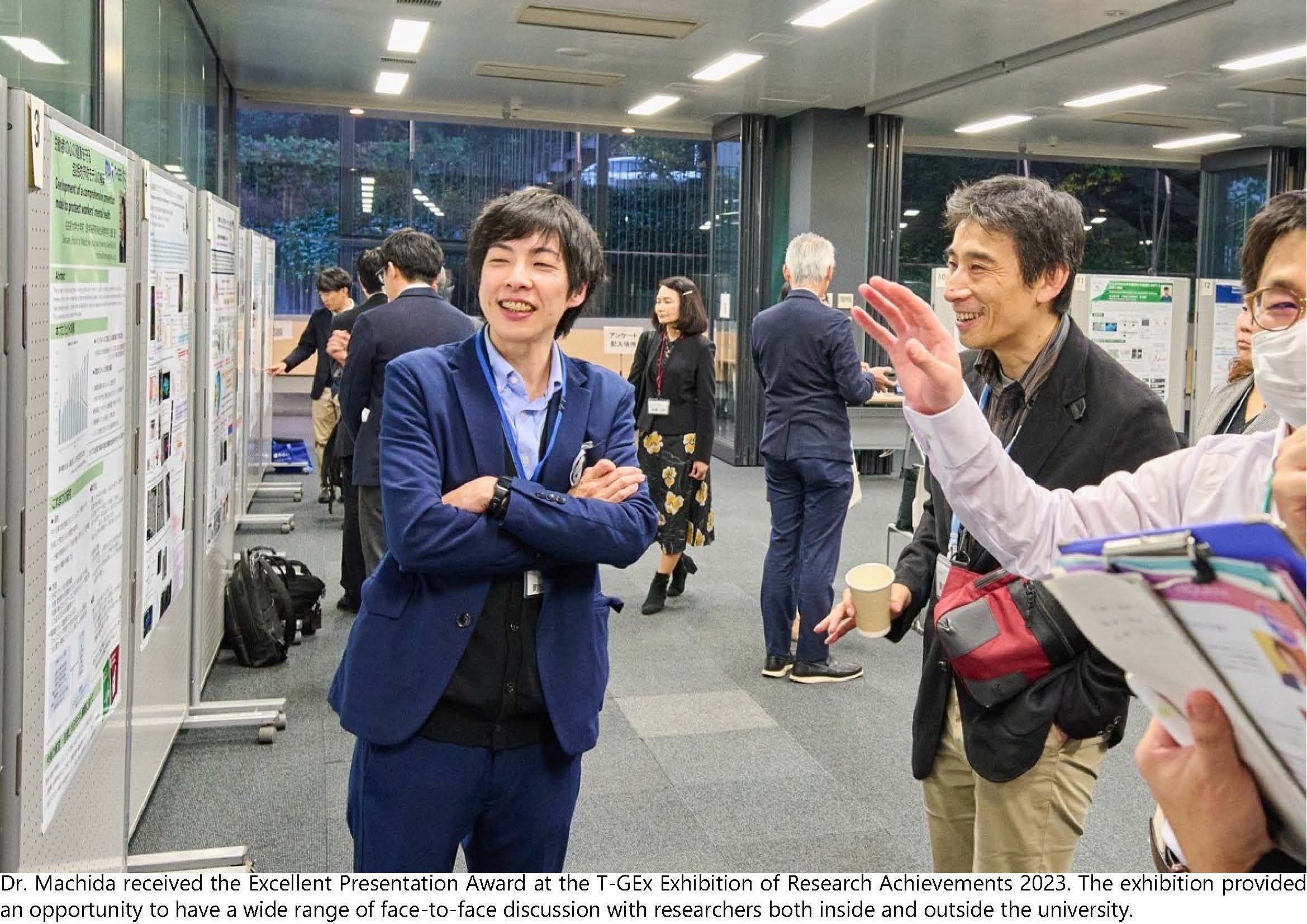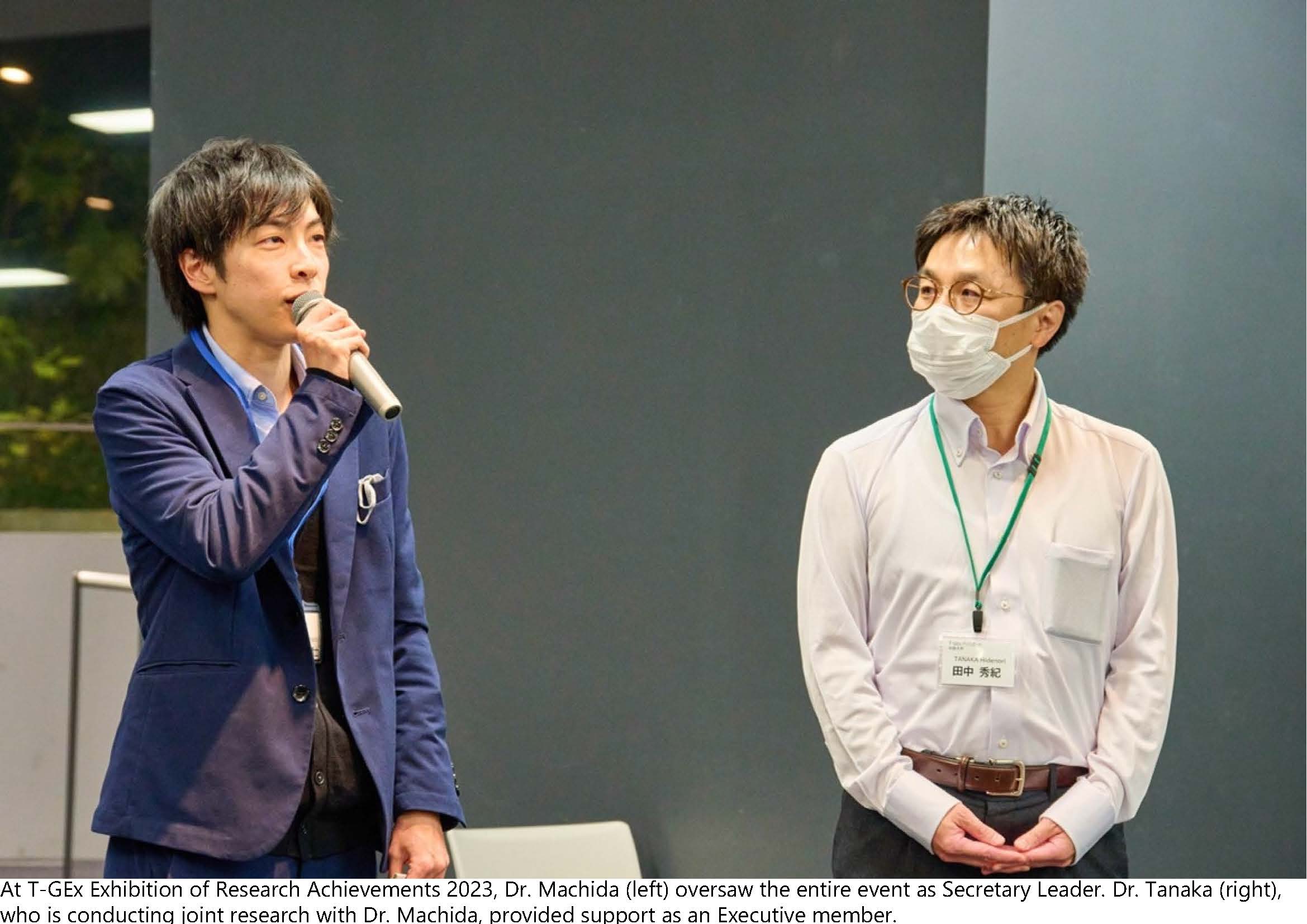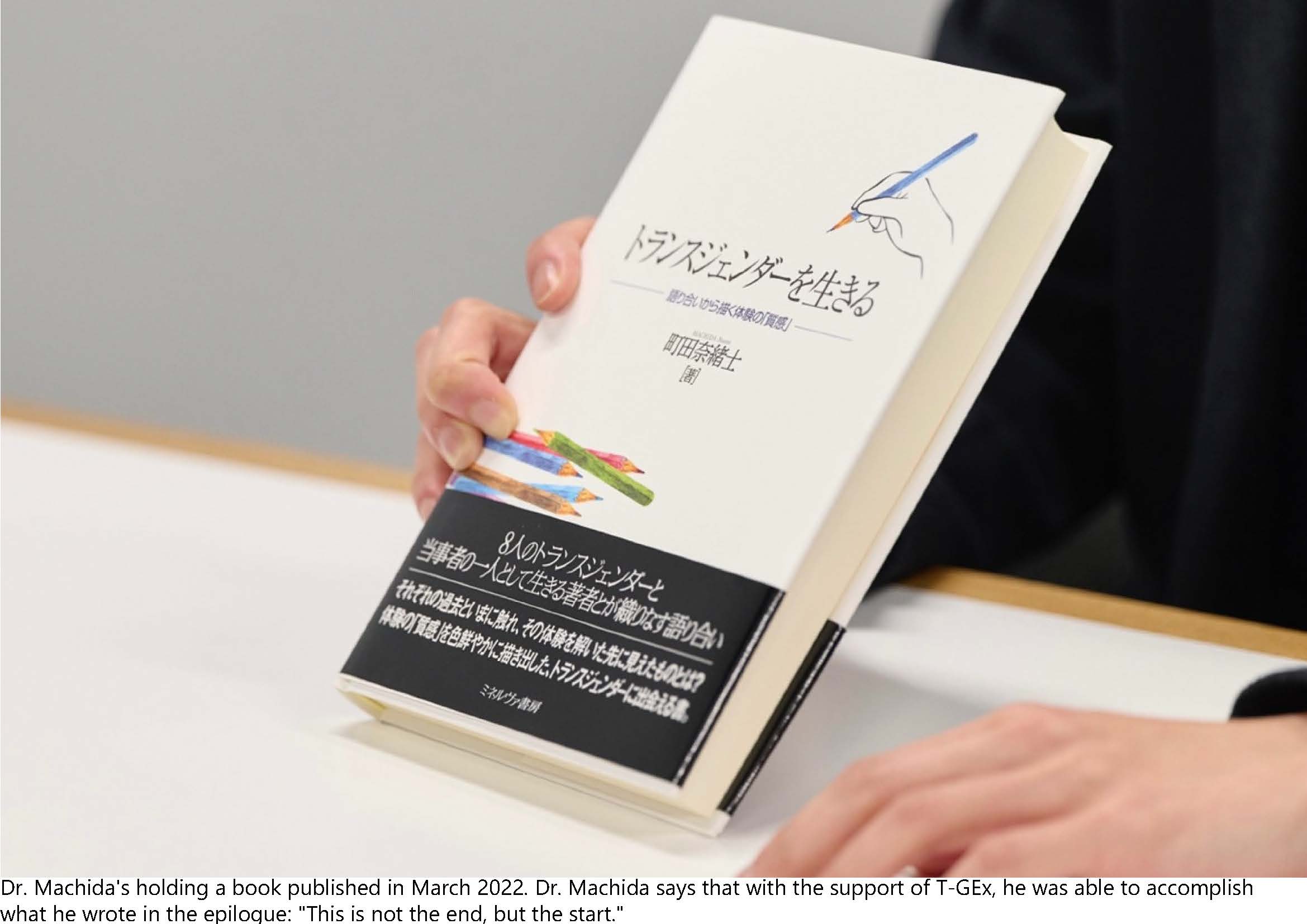
Interviewee Naoto Machida
Dr. Machida researches the actual feelings and physical senses (“qualia”) associated with the experiences of living as a transgender individual, based on interviews and dialogical autoethnography. After serving as a T-GEx fellow for two years, he was appointed Lecturer at Nara Women's University, starting April 2024.
── Congratulations on your appointment! You participated in T-GEx in 2021, shortly after your appointment at Nagoya University, correct?
Yes, I've been engaged with T-GEx for the majority of my tenure at Nagoya University. It holds a significant place in my memories, and I can truly relate to the sentiment expressed by individuals after completing their time at T-GEx, that "Life at Nagoya University = T-GEx." It's a program I'm very grateful to have participated in, as it not only provided me with research funds but also helped me develop my abilities as a researcher.
In fact, I must confess that even as I was drafting my application, I was undecided about whether or not to apply. However, the day just before the deadline, I finally decided to submit it. And when I received the news that I had been selected to proceed to the interview stage, I was pleasantly surprised, as if caught off guard.
──You seemed to have come to a fork in the road of destiny but what were you surprised about?
It was unexpected. Until then, I hadn't succeeded in gaining acceptance to any of JSPS's DC or PD programs, and I anticipated similar outcomes with T-GEx. Moreover, upon noticing that many researchers in T-GEx hailed from scientific backgrounds, I assumed that even those in the humanities would incorporate scientific and international research elements. I thought it would be impossible for me to succeed unless I were one of the brilliant researchers. It seems I made an intuitive decision at a key inflection point, but I believe without a doubt that my participation in T-GEx changed my life at Nagoya University.
*Research Fellowship for Young Scientists Program, Japan Society for the Promotion of Science (JSPS). DC supports doctoral students, and PD supports doctoral students with living expenses and research expenses (Kakenhi).
── What was the underlying state of mind that influenced your intuition to apply to T-GEx?
Well... I hadn't been able to secure government research funding, so I was on the lookout for a program that could potentially offer grants. Additionally, I was eager to engage with fellow researchers from my generation. Center for Gender Diversity, the department I belonged to, was relatively small, and there weren't many peers my age. I remember being attracted to T-GEx not only because it provided research funding, but also because it seemed like it would allow me to interact with researchers both inside and outside the university, and because of its role in fostering young researchers, it seemed that I could gain skills as a researcher in the program.

── It seems that the T-GEx program has gotten you interested in aspects other than research funding.
Yes. Following my involvement in T-GEx, I successfully obtained KAKENHI funding for the first time. Just before the submission deadline, there was a T-GEx training session during which Dr. Kumasaka, the URA overseeing young researchers and conducting this interview, generously offered guidance on the application process. I believe I wouldn't have secured the funding without her support.
── That one was right before the deadline, too (laughs). It was through the program that you started conducting joint research with T-GEx associate researchers, correct?
Indeed. Taking advantage of the opportunity to be involved in Seeds Joint Research (joint research and joint projects with T-GEx Fellows and Associates), I was able to start joint research with Dr. Tanaka Hidenori of Chubu University
── Your colleagues often remark on the excellent synergy between you and Dr. Tanaka. While you've been involved in numerous programs, is there one that stands out to you, Dr. Machida?
It was serving as Secretary for T-GEx Exhibition of Research Achievements 2023
I had my concerns initially. I'm not the typical sort of person to show leadership.
However, I found reassurance in the collaborative spirit of the T-GEx Fellows and Associates. They were proactive and dedicated to their roles, which eased my worries. It felt like a collective effort where I oversaw everything, and together, we achieved success.
 ──So you had your worries as well. Was serving as Secretary despite feeling that you are "not the typical sort of person to show leadership" influenced by your participation in the Leadership Program?
──So you had your worries as well. Was serving as Secretary despite feeling that you are "not the typical sort of person to show leadership" influenced by your participation in the Leadership Program?
Yes, it was. In the final session of the Leadership Program, we had a discussion about the idea that "it's acceptable for each individual to be a leader." We concluded that leadership doesn't always adhere to conventional styles where everyone is led in one direction; instead, it's about leveraging one's unique strengths. Personally, I enjoy listening to others' perspectives, so I pondered if I could use that as a form of leadership. Putting this into practice during the Exhibition of Research Achievements taught me a great deal. The event's success made me realize, "I, too, can do this!" Additionally, being able to invite a professor I highly respect as a presenter made the event even more memorable.
── It was impressive to see you as you faced each executive, confirming, "So this is what it's about." I got the feeling there are also leaders with such techniques.
Did one of your professors, who serves as a role model for you, also attend that day? What aspects of him do you admire?
Similar to myself, that professor specializes in psychology, maintaining an active clinical practice while teaching at the university. Despite his commitments to academia, he remains deeply immersed in clinical work. Additionally, he dedicates time to publishing papers, effectively communicating his research findings aimed at better understanding his clients. I deeply admire his continuous cycle of research and clinical practice. Initially, I was attracted only to practicing as a therapist, but my admiration for the professor led me to think, "Yes, I want to pursue both research and practice."
── While many T-GEx researchers tend to focus solely on their research, I've always sensed a broader perspective in you since the beginning. Do you believe you'll be able to maintain both aspects of your work now that you've joined Nara Women's University?
Absolutely. I was helped tremendously on the issue of clinical activities outside of the university by meeting with my mentor at T-GEx, who gave me helpful hints and practical advice on what kind of clinic I might work at and how to find part-time work. In addition, Nara Women's University plans to place greater weight on classes and seminar activities for students. My research is not of the type that progresses only in the lab, so I find it more fulfilling to have a good balance between clinical practice, education, and research. Having other activities makes me want to do my best in each one. Some people have told me that I am overreaching and becoming careless about everything. I also think people who can devote themselves solely to research are amazing! But I recognize that my style is my style.
 ── Each individual utilizes the mentoring program in their own way, but this is how you used it, right?
── Each individual utilizes the mentoring program in their own way, but this is how you used it, right?
In my case, I wanted to get to know psychology researchers at the Graduate School of Education and Human Development, so it was most welcome that my mentor was from the Graduate School of Education and Development Sciences.
I hesitated to reach out via email without any prior introduction, fearing it might raise suspicions. However, framing my communication with, "I'd like to discuss a mentoring program," facilitated the process of contacting individuals. In addition to refining the focus of my research, I gleaned valuable insights regarding my upcoming fixed-term position at Nagoya University.
── How do you intend to utilize what you learned from T-GEx going forward?
There are many aspects for which I don't yet have a concrete idea, but I envision continuing the joint research that began at T-GEx while positioning it as a KAKENHI-funded project. This will be my first-time teaching seminar students at Nara Women's University, so I hope to consult with colleagues I met through T-GEx.
With time and practice, I aspire to conscientiously mentor the next generation, ensuring that the students I instruct contribute something novel to their fields.
── What is your message to current and future T-GEx Fellows and Associates?*
First of all, I would like to express my gratitude to everyone who has helped me. I would also appreciate any potential connections arising through research in the future. To those who aim to become T-GEx Fellows or Associates in the future, I would like to emphasize that this is a program not simply providing grants to fund research, but that also enables you to connect with people and that provides support enabling you to have experiences to expand your future possibilities, even if you aren't confident, you can do it at the moment.
As mentioned earlier in the interview, I've come to realize that what I once perceived as weaknesses were often viewed as strengths by others. I'm really glad that I trusted my intuition in choosing to participate in T-GEx. I believe that having faith in something that truly resonates with you and taking decisive action on it can pave the way for success in the future."
* T-GEx Fellows are researchers from Nagoya University and Gifu University; T-GEx Associates refers to researchers from affiliated academic institutions in the Tokai region.
Interview: Dr. KUMASAKA Mayuko (URA of Academic Research & Industry-Academia-Government Collaboration, Nagoya University)
Text: Dr. MARUYAMA Megumi, Dr. YOSHIDA Aruto (URA of Academic Research & Industry-Academia-Government Collaboration, Nagoya University)

